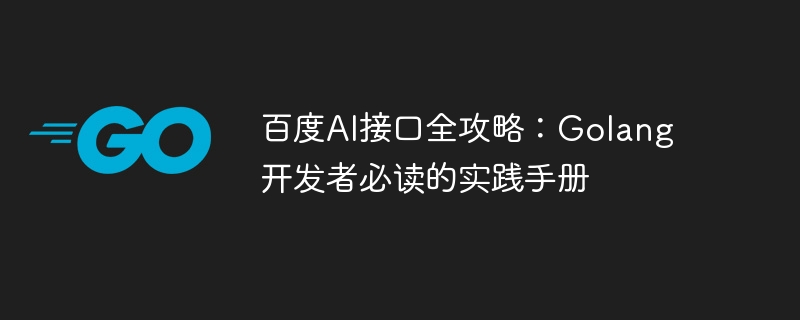百度AI介面全攻略:Golang開發者必讀的實踐手冊
- WBOYWBOYWBOYWBOYWBOYWBOYWBOYWBOYWBOYWBOYWBOYWBOYWB原創
- 2023-08-12 12:40:501086瀏覽

百度AI介面全攻略:Golang開發者必讀的實踐手冊
摘要:隨著人工智慧技術的不斷發展,百度AI介面成為了眾多開發者的關注焦點。本文將介紹如何在Golang環境中使用百度AI介面進行開發,並提供實用的程式碼範例,幫助開發者快速上手並實作各種功能。
一、準備工作
在開始之前,我們首先需要做一些準備工作。
安裝Golang
首先,確保你已經安裝了Golang開發環境。你可以前往Golang官方網站(https://golang.org/)下載並安裝最新版的Golang。
註冊百度開發者帳號
在使用百度AI介面之前,你需要註冊一個百度開發者帳號,並建立一個應用程式。在創建應用程式的過程中,你會獲得一個API Key和Secret Key。這些資訊將在後面的程式碼中使用到。
安裝相關函式庫
Golang有豐富的第三方函式庫支持,我們可以使用它們來方便地使用百度AI介面。以下是一些常用的函式庫,可以使用go get指令來安裝:
go get -u github.com/astaxie/beego go get -u github.com/stretchr/testify go get -u github.com/parnurzeal/gorequest
二、文字辨識API
文字辨識API提供了將圖片中的文字識別為可以編輯的文字的功能。以下是使用該API的範例:
package main
import (
"fmt"
"github.com/parnurzeal/gorequest"
)
func main() {
url := "https://aip.baidubce.com/rest/2.0/ocr/v1/general_basic"
apiKey := "your_api_key"
secretKey := "your_secret_key"
imageFile := "path/to/your/image.jpg"
request := gorequest.New()
_, body, _ := request.Post(url).
Query("access_token", getAccessToken(apiKey, secretKey)).
Type("multipart").
SendFile(imageFile, imageFile).
End()
fmt.Println(body)
}
func getAccessToken(apiKey, secretKey string) string {
url := "https://aip.baidubce.com/oauth/2.0/token"
request := gorequest.New()
_, body, _ := request.Get(url).
Query("grant_type=client_credentials").
Query("client_id=" + apiKey).
Query("client_secret=" + secretKey).
End()
return parseAccessToken(body)
}
func parseAccessToken(response string) string {
// 解析返回的 JSON 数据,获取 access_token
// 省略解析代码
// ...
}上述範例中,我們透過gorequest庫發送了一個POST請求,並在查詢參數中加入了API Key和Secret Key以及要辨識的圖片檔。使用getAccessToken函數可以取得到存取令牌,從而允許我們存取百度AI介面。
三、人臉辨識API
人臉辨識API可用於辨識圖片中的人臉訊息,並提供了各種功能,如人臉偵測、人臉比對等。以下是使用該API的範例:
package main
import (
"fmt"
"github.com/parnurzeal/gorequest"
)
func main() {
url := "https://aip.baidubce.com/rest/2.0/face/v3/detect"
apiKey := "your_api_key"
secretKey := "your_secret_key"
imageFile := "path/to/your/image.jpg"
request := gorequest.New()
_, body, _ := request.Post(url).
Query("access_token", getAccessToken(apiKey, secretKey)).
Type("multipart").
SendFile(imageFile, imageFile).
End()
fmt.Println(body)
}
func getAccessToken(apiKey, secretKey string) string {
url := "https://aip.baidubce.com/oauth/2.0/token"
request := gorequest.New()
_, body, _ := request.Get(url).
Query("grant_type=client_credentials").
Query("client_id=" + apiKey).
Query("client_secret=" + secretKey).
End()
return parseAccessToken(body)
}
func parseAccessToken(response string) string {
// 解析返回的 JSON 数据,获取 access_token
// 省略解析代码
// ...
}上述範例中,我們同樣使用了gorequest函式庫發送了一個POST請求,並在查詢參數中加入了API Key和Secret Key以及要辨識的圖片檔。然後我們可以透過解析傳回的結果來取得人臉相關的資訊。
四、語音合成API
語音合成API可用於將文字轉換為語音,並提供了各種功能,例如選擇語音人物、控制語速等。以下是使用該API的範例:
package main
import (
"fmt"
"github.com/parnurzeal/gorequest"
"io/ioutil"
"os"
)
func main() {
url := "https://aip.baidubce.com/rpc/2.0/tts/v1/synthesis"
apiKey := "your_api_key"
secretKey := "your_secret_key"
text := "欢迎使用百度语音合成API"
requestBody := fmt.Sprintf(`{"tex":"%s","lan":"zh","cuid":"%s"}`, text, "your_unique_id")
request := gorequest.New()
_, body, _ := request.Post(url).
Query("access_token", getAccessToken(apiKey, secretKey)).
Send(requestBody).
End()
saveAudio(body, "output.mp3")
fmt.Println("合成完成!")
}
func getAccessToken(apiKey, secretKey string) string {
url := "https://aip.baidubce.com/oauth/2.0/token"
request := gorequest.New()
_, body, _ := request.Get(url).
Query("grant_type=client_credentials").
Query("client_id=" + apiKey).
Query("client_secret=" + secretKey).
End()
return parseAccessToken(body)
}
func parseAccessToken(response string) string {
// 解析返回的 JSON 数据,获取 access_token
// 省略解析代码
// ...
}
func saveAudio(data string, fileName string) {
err := ioutil.WriteFile(fileName, []byte(data), os.ModePerm)
if err != nil {
fmt.Println("保存文件失败:", err)
return
}
fmt.Println("文件保存成功:", fileName)
}上述範例中,我們使用了gorequest函式庫發送了一個POST請求,並在查詢參數中加入了API Key和Secret Key。我們透過設定請求體的tex欄位為要合成的文字,並指定了語言為中文。然後透過解析傳回的結果將合成的語音儲存為MP3檔。
五、總結
本文介紹如何在Golang環境下使用百度AI介面進行開發,並提供了文字辨識、人臉辨識和語音合成三個API的範例程式碼。透過閱讀本文,相信你可以快速上手使用百度AI接口,並在你的應用中實現各種有趣、實用的功能。希望這篇文章對你有幫助,祝你在Golang開發中取得更好的成果!
以上是百度AI介面全攻略:Golang開發者必讀的實踐手冊的詳細內容。更多資訊請關注PHP中文網其他相關文章!

